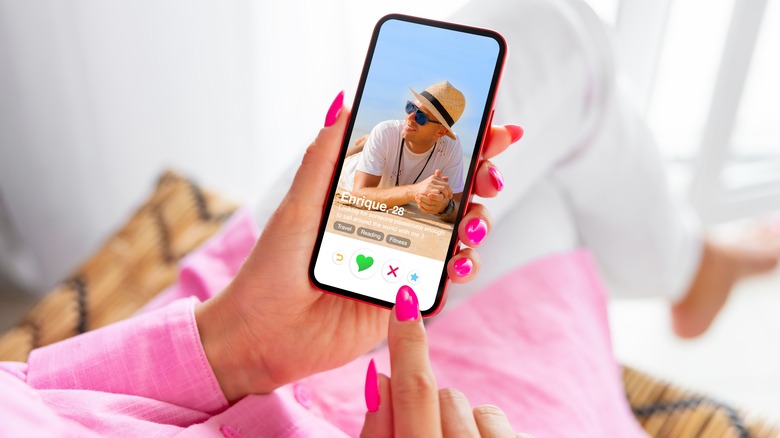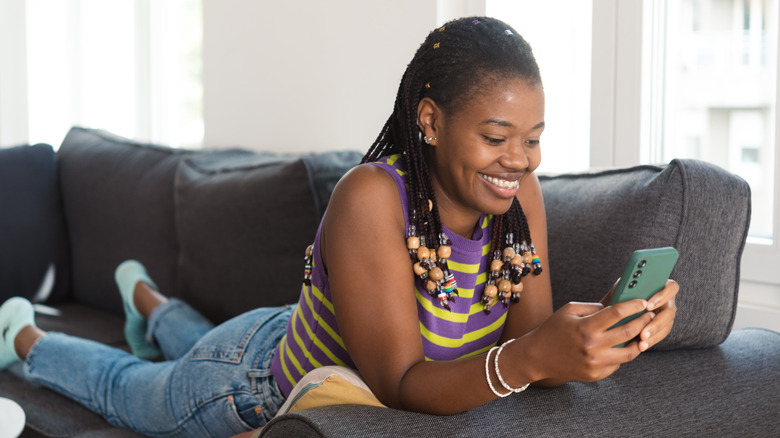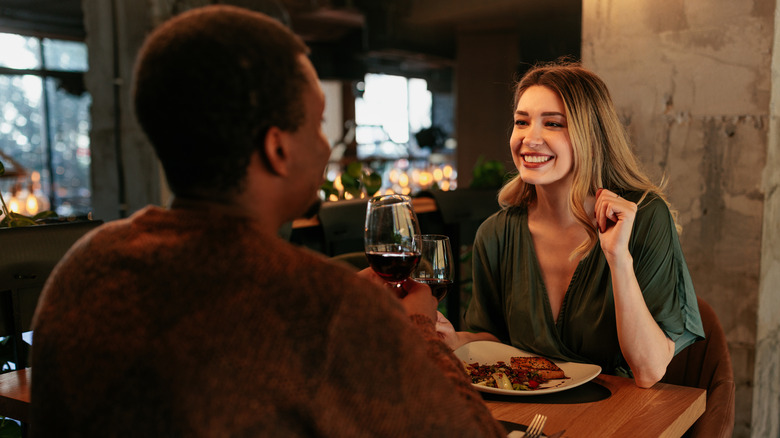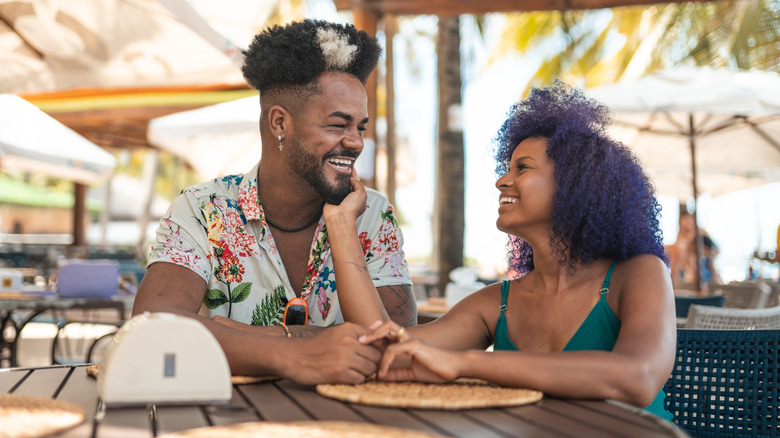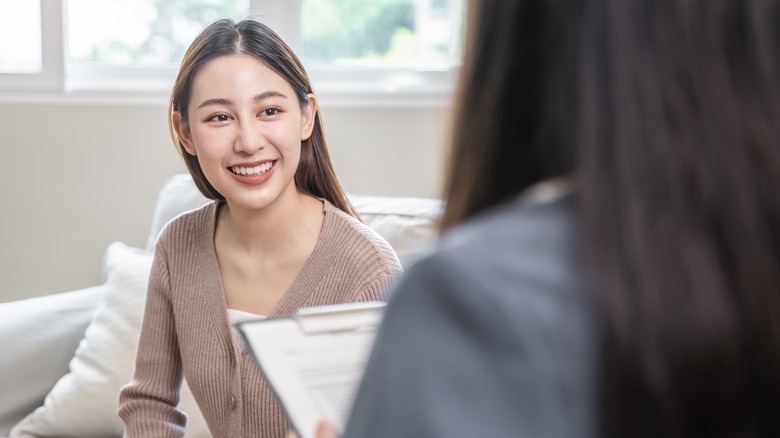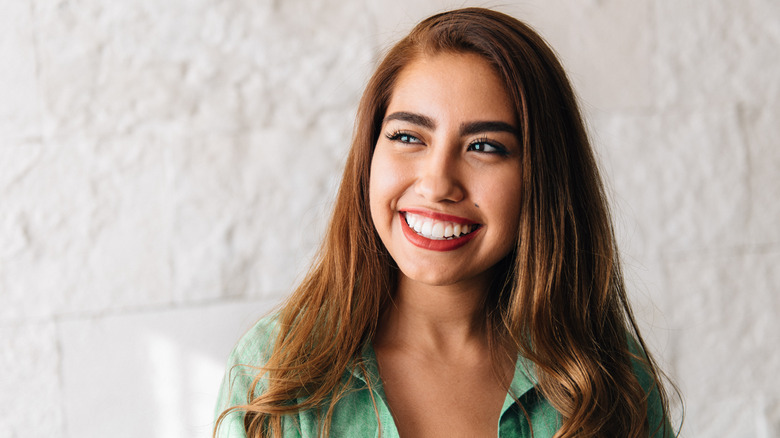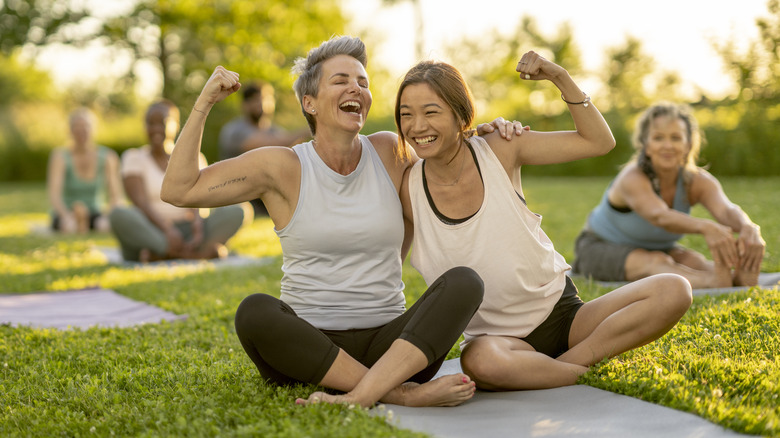Psychologist's Advice For Dating When You're Dealing With Mental Health Struggles - Exclusive
Dating isn't easy at the best of times, but it can be even more anxiety-inducing when you're struggling with your mental health. But just because you're still working on yourself, as all of us should be, that certainly doesn't mean you're not worthy of love and shouldn't put yourself out there if dating is what you want to do.
In fact, dating while dealing with mental health is probably more common than you might think. Logan Ury, director of relationship science at Hinge, told The Thirty in 2022 that 78% of Hinge users consider themselves to be working on their mental health. Also, 29% of people on the app said they were spending time with a therapist or mental health professional. "Enter the age of enlightened dating. Singles are focusing on their mental health and want to date someone who has also done the work and invested in themselves," Ury shared.
So now that we know mental health is most certainly not a roadblock when it comes to the dating scene, how on earth do you get out there? Well, Women.com spoke exclusively to Carolyn Rubenstein, a licensed psychologist and wellness expert, about some of the best ways to dip your toe back into the dating world while preserving your mental health at the same time.
Know there's no need to jump right into the dating scene
One of the best ways to get ready to date again is by building up to it slowly. You don't have to jump right in and go on multiple dates a week to be making progress. Instead, try putting yourself in lower-pressure social situations, so you can get used to being around people and get some confidence back. "Try taking small steps to put yourself out there," Dr. Rubenstein exclusively told Women.com. "This may involve joining a group, attending events that interest you, or conversing with people you meet daily. As you become more comfortable with these small interactions, you can gradually work up to more significant connections."
You may also want to use apps to ease yourself back into the dating world. Try chatting to one or two people and building a rapport before actually meeting — or even don't talk at all! Remember that you don't owe anyone a message. If just having a few swipes on an app before moving on to the next step would help you, then that's the best way to go. Just make sure you set some boundaries. "Have a system. How much are you willing to engage with somebody before you actually meet and make it real? If somebody is not meeting you in the way that works for you, it's far better to just let them go," Keely Kolmes, a psychologist who specializes in sex and relationships, told Time.
Work out what you want from your potential partner before you start dating
"My biggest tip for people who want to date with purpose is first to take the time to focus on yourself and reflect on what you want out of a relationship before jumping into the dating world," Logan Ury told The Thirty. "After self-reflecting and deciding on what you want, you should embrace the trend of 'hardballing.' Hardballing means someone is being clear about their expectations of a relationship from the beginning, whether you want a serious long-term partnership or a casual fling," he added.
If you'd rather not date anyone who's not looking for a relationship, for example, you may want to make that clear before the first date, particularly if you know a bad date might be detrimental to the way you feel about yourself. Don't be worried about scaring someone off by being so forward, as someone who's worth spending time with won't be put off by your no-nonsense approach if they're genuinely interested.
By being open and honest from the start about what you're looking for, you're also giving someone the opportunity to be along on the ride from the start — or not. Though it's never nice to hear someone you like isn't on the same page as you, what it does mean is that you're less likely to get invested in someone who doesn't want the same things and risk your mental health spiraling as a result.
Prepare yourself for rejection (it's not always personal)
Let's be honest, the dating game isn't always the nicest and most confidence-boosting way to spend your time. You're probably going to face some rejection, just as you're probably going to go out with a few duds who may make you lose hope of finding someone who's right for you. But try not to take any dumpings or bad dates personally. As psychologist Dr. Carolyn Rubenstein exclusively told us (and we can attest to), it happens to us all! "Remember that everyone experiences rejection and disappointment in dating and that it doesn't define your worth," she shared. "Treat yourself with compassion and forgiveness, and don't be too hard on yourself."
Therapist Wale Okerayi also suggested to The Thirty that you should keep re-affirming yourself even in the worst moments, to try and maintain the kind of positive mindset that will attract what you want. "Dealing with rejection or being ghosted can take a heavy toll on us mentally; one way to push past those things is to write out some affirmations about yourself and repeat them often," she shared.
It's also worth remembering that if you stop getting a response from someone, there could be a whole host of reasons that aren't personal. Not getting a message back isn't always necessarily a rejection, it could just be that they're busy, lost their phone, or may even be taking a mental health break themselves. So try not to take it to heart.
Don't be ashamed of sharing your struggles
Feeling like you can open up to your date about your mental health can have a number of benefits. Not only does it have the potential to bring you closer as you both get more vulnerable, but by being so honest, you may even find that they've been (or are maybe still) going through a similar thing themselves.
If you're worried about opening up, you may want to wait until you know them a little better. "Conversating about your mental health with someone you're dating can be a vulnerable and challenging experience," Dr. Rubenstein said exclusively to Women. "There are a few factors to determine when you're ready to have this conversation. If you don't feel comfortable confiding in your partner, waiting until you've developed a more profound connection may be best. Timing is also essential." They also suggested the best time to talk is when you're both calm and able to have a full conversation that won't be cut short. "Start by sharing what you feel comfortable sharing and gauge their response. You can gradually share more details as you both become more comfortable," she added.
Dr. Rubenstein also suggested setting the scene by letting them know you have something personal you want to share, and then being open to the idea that you may need to better educate them — and that's okay. "You can share some reliable resources with them and explain mental health and its impact on your life," she said.
Only share details of your mental health experience you feel comfortable with
Just because you're opening up to your date about your experience with mental health, doesn't mean you have to get candid about absolutely everything if you don't want to. As things progress with the other person, you'll likely feel increasingly comfortable sharing more over time, and getting to know each other better will also give you an idea of how they'll be able to support you. "It's okay to admit that you're struggling, and it's okay to share your diagnosis if you feel comfortable doing so. Being open and transparent about your experiences can help the other person understand what you're going through and provide the necessary support," Dr. Carolyn Rubenstein exclusively told us. But that doesn't mean you have to share absolutely everything.
"Ultimately, the decision to share a plan for therapy or treatment is up to you. If you feel comfortable doing so, showing that you are taking proactive steps to manage your mental health can be helpful," Rubenstein shared. "But if you don't have a plan, don't let that hold you back from honest conversations with your partner about your needs and how they can support you."
Get help if you feel you need it
As we know, there's absolutely no shame in asking for help when you need it. In fact, it's one of the best and strongest things you can do for yourself. How much help you need will be totally dependent on your frame of mind and the situation — it could be something as simple as meeting a friend for coffee or something a little more significant, like scheduling an appointment with a therapist. "Having a support system of friends, family, or a therapist who can offer encouragement and advice as you navigate the dating world can be helpful. Don't hesitate to contact people you trust and ask for their support," Dr. Rubenstein shared exclusively with Women.com.
It may also be helpful, if you're beginning to struggle, to gather those closest to you and head out to do something fun away from the dating world, for a little self-love day. "Do things that would, in general, support your mental health and self-worth, so that it doesn't get caught in the cycle of what's happening on your phone," Keely Kolmes told Time. This can be particularly useful for those using dating apps, where it can feel like there's an endless supply of people to talk to constantly. Spending even just a few hours with those closest to you can do wonders for helping you feel refreshed and in a better frame of mind when you head back to the app.
Take a break if you need it
Don't think that putting yourself out there to date again means you have to stay out there permanently. If you're finding the whole thing overwhelming, it's absolutely fine to take a break. If you're trying online dating, take a week, a month, or even more away from swiping to reset yourself. If you're heading out to bars or clubs to meet people in person, you may want to stay away from those places for a short period of time to enjoy just being out without the pressure of finding dates.
You may also want to change up the way you're dating. If you're using a specific app to try and find a partner, try a different one to see if you prefer it. Each one has its unique traits, with apps like Bumble, for example, letting the woman speak first, which you may feel more comfortable with. It's all about finding out what works best for you!
If meeting someone is what you want to do though, don't ever let mental health issues stop you from dating permanently. As Megan Barton Hanson told Vice, "It's important for people to remember that you can still be a really good and supportive partner, and you are worthy of being loved even when your mental health isn't A-OK. You don't have to be this ideal person before you put yourself out there. You're not 'broken', you're just living."
Be your own biggest dating cheerleader
In addition to seeking help from other people, remember that you can be your own greatest cheerleader. It's easy, while dating, to feel demoralized, sexualized, or used, but it's important to never forget your worth. When you're in a confident mood, life coach Catri Barrett suggested creating a positivity note in your phone, which you can refer back to when you're at your lowest after a bad date or negative conversation.
"In it, list all your worth and value that you can refer back to whenever you need a pep talk," she proposed to Cosmopolitan. Looking back at your list, which should be full of positive self-talk, will also make those awkward early conversations easier. Not only will you learn not to question your worth because of people who don't even deserve your time, but that extra confidence boost will help you maintain your positivity to keep on trying if things don't work out with someone.
Similarly, it's a good idea to keep checking in with yourself throughout your dating experience to ensure you're truly happy and on the path you really want to be on. "Ask yourself questions like: Am I still feeling confident? Is this still fun for me or does it feel like a chore? Am I overwhelmed or anxious?" therapist Wale Okerayi told The Thirty.
Try mental health friendly dates
It's no secret that many classic date ideas these days revolve around drinking alcohol. For a lot of people experiencing mental health issues though, drinking can only exasperate things — and you may also find yourself sharing more than you intended to when it comes to your personal life.
In a column for Vice, former "Love Island" star and influencer Megan Barton Hanson suggested ditching the drinks and trying something else where alcohol isn't the focus. "Go to a gig, go to an art gallery, go to a market and walk around. Think outside the box and try to do things that will make you feel good, rather than feeling bad and numbing it by going to the pub," she shared.
Equally, if you feel like your mental health has the potential to ruin your date because you start to feel anxiety or self-doubt before you step out the door, why not do things with your date that you know usually help you? If exercising is one of your methods for helping improve your mental health, you could both head to a yoga class together, where you're more likely to feel calmer and more secure. There are no rules when it comes to what you have to do on your dates, and you may even find that doing something unexpected helps you both bond better and have more fun.
